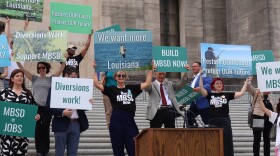The next mayor of New Orleans will face the unique challenge of leading a city surrounded by water.
“ Even though it is what brings the city to life, it's also what often threatens our lives,” said Christopher Dalbom, director of the Tulane Institute on Water Resources Law & Policy. “And so it’s a challenge for anyone just to live in this city, but even much more so it's a challenge to lead this city.”
Mayoral candidates Helena Moreno, Frank Janusa, Oliver Thomas and Royce Duplessis explained how they would tackle the city’s water issues at the New Orleans Mayoral Forum on Water and Coast on Tuesday evening.
Here’s a recap of what they said:
Water infrastructure
Candidates emphasized funding needs to improve water infrastructure in the city, such as stormwater drainage.
Moreno expressed her support for a stormwater fee to shore up funding for the city’s drainage system, but she said that money should not go towards the Sewerage and Water Board of New Orleans (SWBNO).
“ How do we ensure that this funding goes to a separate entity other than the sewerage and water board?” she said. “So that the people of the city actually trust it’s going someplace else, because I don't think that anyone's gonna vote for money just going to the Sewerage and Water Board.”
Moreno also said she has started talking with other parishes about creating a regional drinking water authority to share resources in response to the past three years of saltwater intrusion in the Mississippi River, contaminating Plaquemines Parish’s drinking water and threatening New Orleans’.
Oliver Thomas highlighted a whole-of-government approach to water, educating all departments on the city’s waterscape and working with local businesses and nonprofits.
“ The biggest challenge that the next mayor's gonna have is: How do we at least get everyone on the same page and understanding what sustainability and resiliency is?”
Janusa, the only Republican in the race, said he would tap into his party's relationship with Louisiana Gov. Jeff Landry’s and President Donald Trump’s administrations to get more funding.
“ We're gonna need state funds and we're gonna need federal funds in order to do anything of substance in the water environment area,” he said.
He also said that the city would need to sell bonds to make up for SWBNO’s deficit.
Duplessis said the best work on drainage was being done by community groups, such as implementing bioswales and rain barrels. He said the city government should make it easier for those groups to do that work.
“ I look beyond just what government is doing. It's about government working with the organizations who know best how to deal with water in our city,” he said.
Coastal restoration
On the topic of the city’s role in coastal restoration efforts, candidates expressed disappointment with the cancellation of the Mid-Barataria sediment diversion, a $3 billion project that was meant to engineer the Mississippi River to build more land in Plaquemines Parish.
“The current governor came and essentially tanked the settlement diversion project that we are all very concerned about,” said Duplessis. “We're gonna have to think beyond just the daily issues of running a city, the daily quality of life issues that are necessary for us to address as a city. Because if we don't deal with coastal restoration, we won't have a city.”
Duplessis added that the city will need to work more closely with the state on coastal restoration.
Moreno touted her experience working on the state’s Coastal Master Plan during her time in the legislature and her work on a resolution passed by the city council indicating support for the project.
Thomas spoke about partnering not only with other parishes but also with other states in the Mississippi River Basin to manage the river and its pollution flowing down from the upper basin.
“There's gonna have to be a relationship with everybody in the 33-state tributary system,” he said. “A healthy Mississippi doesn't happen if our friends that are part of the tributary are polluting, not respecting and not building back parts that they may be losing because of the lack of sediment.”
Janusa also emphasized the need for cooperation and to get creative on future coastal restoration projects.
“ We can't just keep dropping Christmas trees near Grand Isle. We've gotta think outside the box. We've gotta look at every avenue,” he said. “We've got to employ those individuals, those ecologists, those environmental specialists, those engineers, those planners, those dreamers, to make that a reality.”
Climate adaptation and resilience
All four candidates emphasized working with nature to adapt to climate change and solve the city’s flooding and drainage problems, such as green infrastructure projects, planting more trees and wetland restoration.
They also talked about what was needed to keep the city from lagging on these projects, like the Mirabeau Water Garden, which took the city 7 years to break ground on.
“What people don’t know is the last two administrations programmed more projects than we had the capacity to build,” said Thomas.
Thomas spoke about hiring talented project managers who can keep the work on task. Duplessis agreed and added that the city needs to make a concerted effort to hire and retain talented employees.
“ There have to be true performance metrics and outcome metrics in place, and excuses cannot exist,” he said.
Duplessis also said he wants to improve the payment system for vendors working with the city.
Janusa said he wants to guarantee that 25% of city contracts go to disadvantaged business enterprises (DBEs) and that there should be more investment in career training.
“We need to advance the trades themselves, be it electricians, pipe fitters, HVAC people, plumbers, you name it,” he said. “Once we start doing that through something like a new Delgado Trade School, then we can generate not just jobs for people, but careers.”
Urban Land Institute Louisiana also had candidates fill out a questionnaire on these issues and posted answers on their website.






